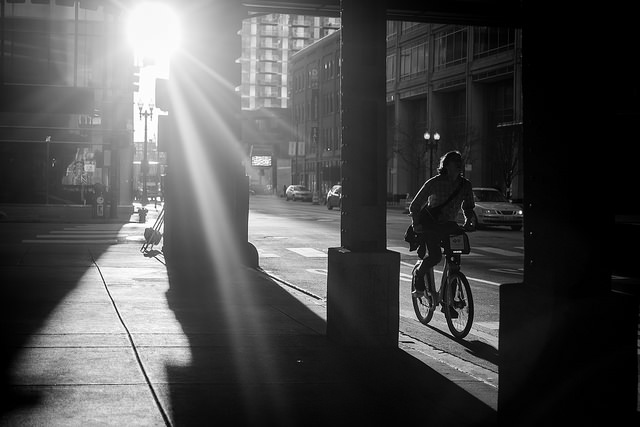Bike Courier's Death Reignites Debate Over Regulating Chicago Cyclists
By Stephen Gossett in News on Jun 17, 2016 8:21PM
A long, sometimes fractious debate exists across many cities between bikes and cars, cyclists and motorists. That's certainly the case in Chicago where—despite a bike-sympathetic local administration, a robust cycling advocacy network and a popular bike-share program—some voices regularly cry for greater cycling regulations.
The most recent such case, which immediately follows the tragic death of bike courier Blaine Klingenberg, is a rather out-of-touch, poorly timed op-ed by Marilyn Katz, President of MK Communications, published on Thursday by the Tribune. Titled "Make bicyclists accountable to the same rules of the road as motorists," Katz's piece, however well intended, unfortunately reiterates some of the usual hoary clichés often trotted out in the debate.
First, some background: Klingenberg was killed after being struck near the intersection of Oak Street and Michigan Avenue, just north of the Magnificent Mile. He had just gotten off work from his messenger gig and posted a message on Facebook asking “Who’s down for the lake?” The accident occurred shortly after. He was struck and pinned underneath a double-decker tour bus around 5:30 p.m. He was pronounced dead on arrival at Northwestern Hospital.
Needless to say, that’s an incredibly busy area that would certainly benefit from more biking infrastructure. Katz also mentions that Klingenberg “violated the law,” referring to reports that he blew a red light, but she also leaves out conflicting reports that claimed the bus also committed a moving infraction. Brendan Kevenides, an attorney who advocates for Illinois cyclists at Freeman Kevenides Law Firm, calls such an omission offensive. “This is someone who is very experienced, a professional. The idea that he blindly, consequences-be-damned barreled forth doesn’t make sense,” Kevenides told Chicagoist.
Katz also brings up the familiar proposal of bike licensing. “Just as we require motorists or horse-drawn carriage drivers to pass the rules-of-the-road examination, so too should bicyclists,” she writes. But this added impediment would likely result in fewer cyclists on the road, which leads to decreased visibility and more accidents, argues Kevenides. “What makes roads safer—even more than people wearing a helmet more than helmet—is more cyclists for drivers to see and anticipate. We should make the bar very low. It also makes it more likely to create political backing to get more infrastructure in place.”
Katz makes small conciliatory gestures. She acknowledges the lowering of transportation costs provided by bikes. She also describes herself as a "hesitant cyclist" with sympathy for those injured by negligent motorists. But in the next breath she portrays cyclists as an undifferentiated whole of reckless actors: "But I'm more terrified as a driver—truly afraid that I will be the one who strikes a cyclist—not because I'm careless but because rules of the road for bicyclists are basically ignored."
Again, Kevenides dispels the notion. "Based on my experience, this idea of crazy, irresponsible people is a myth to the extent. I’m not saying it doesn’t happen, but no more so than drivers or other road users," he says. "When was the last time you were behind a wheel and came to complete stop at stop sign?"
Kyle Whitehead, Government Relations Director at Active Transportation Alliance, similarly disavows the impression of carelessness, and directs focus back on motorists.
"Cars going 10 miles-per-hour over the speed limit and rolling through stop signs are commonplace and rarely enforced. A cyclist observed going through a stop sign carries an exaggerated perception of lawlessness," Whitehead told Chicagoist. "We have a culture of speeding, a culture of reckless driving. To place a bulk of the burden on people biking, and say we need to register bikes, is misdiagnosing the problem.”
"Everyone should stay within the law, but cars have a greater responsibility," he says.
Katz commendably avoids the inflammatory rhetoric we’ve seen from, say, Tribune Columnist John Kass. But at the end of the day, her perspective remains part of the problem.
